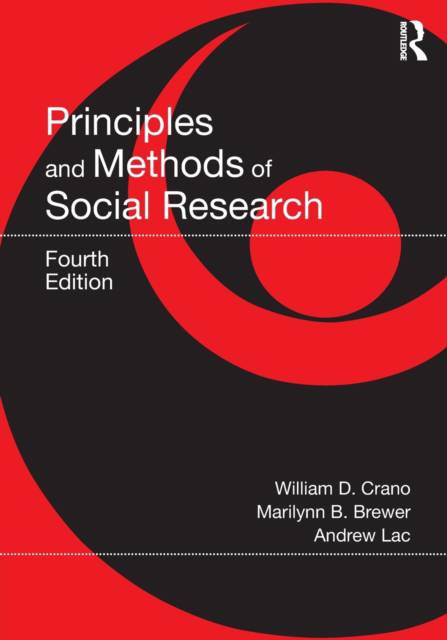
- Retrait gratuit dans votre magasin Club
- 7.000.000 titres dans notre catalogue
- Payer en toute sécurité
- Toujours un magasin près de chez vous
- Retrait gratuit dans votre magasin Club
- 7.000.0000 titres dans notre catalogue
- Payer en toute sécurité
- Toujours un magasin près de chez vous
Principles and Methods of Social Research
William D Crano, Marilynn B Brewer, Andrew LacDescription
Through a multi-methodology approach, Principles and Methods of Social Research, Fourth Edition covers the latest research techniques and designs and guides readers toward the design and conduct of social research from the ground up. Applauded for its comprehensive coverage, the breadth and depth of content of this new edition is unparalleled.
Explained with updated applied examples useful to the social, behavioral, educational, and organizational sciences, the methods described are relevant to contemporary researchers. The underlying logic and mechanics of experimental, quasi-experimental, and non-experimental research strategies are discussed in detail. Introductory chapters cover topics such as validity and reliability furnish readers with a firm understanding of foundational concepts. The book has chapters dedicated to sampling, interviewing, questionnaire design, stimulus scaling, observational methods, content analysis, implicit measures, dyadic and group methods, and meta-analysis to cover these essential methodologies. Notable features include an emphasis on understanding the principles that govern the use of a method to facilitate the researcher's choice of the best technique for a given situation; use of the laboratory experiment as a touchstone to describe and evaluate field experiments, correlational designs, quasi experiments, evaluation studies, and survey designs; and coverage of the ethics of social research including the power a researcher wields and tips on how to use it responsibly.
The new edition features:
- Increased attention to the distinction between conceptual replication and exact replication and how each contributes to cumulative science.
- Updated research examples that clarify the operation of various research design operations.
- More learning tools including more explanation of the basic concepts, more research examples, and more tables and figures, such as additional illustrations to include internet content like social media.
- Extensive revisions and expansions of all chapters.
- A fuller discussion of the dangers of unethical treatment to research participants.
Principles and Methods of Social Research, Fourth Edition is intended for graduate or advanced undergraduate courses in research methods in psychology, communication, sociology, education, public health, and marketing, and further appeals to researchers in various fields of social research, such as social psychology and communication.
Spécifications
Parties prenantes
- Auteur(s) :
- Editeur:
Contenu
- Nombre de pages :
- 472
- Langue:
- Anglais
Caractéristiques
- EAN:
- 9781032222400
- Date de parution :
- 11-07-23
- Format:
- Livre broché
- Format numérique:
- Trade paperback (VS)
- Dimensions :
- 178 mm x 254 mm
- Poids :
- 839 g

Les avis
Nous publions uniquement les avis qui respectent les conditions requises. Consultez nos conditions pour les avis.






